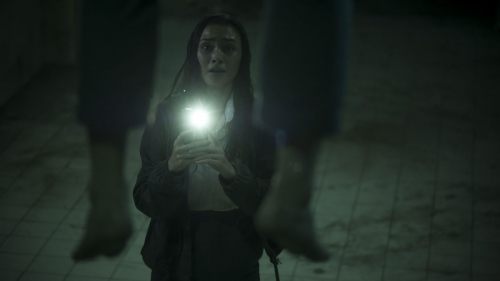Fantasia 2019 Review: KILLERMAN Tastes Like A Gritty Grit Sandwich
Killerman is like a middle-schooler experimenting with makeup: it doesn’t know what it wants to be, but it definitely knows who it’s trying to imitate. With grainy, underlit handheld cinematography, a ruthless cast of cold killers, and a booming synth soundtrack, Malik Bader tries his best to evoke the hardened New York City of '70s and '80s crime cinema. But without the interesting character work or genuine misanthropy of those films, the grittiness of this Liam Hemsworth-vehicle just isn’t that convincing.
Hemsworth plays Moe, a jeweler who launders money for the New York City mob. His work is safe and simple relative to other criminal enterprises, until he’s roped into a big heroin deal by his laundering partner Skunk (Emory Cohen). Skunk is tired of being pushed around by his mob boss uncle (Pusher’s Zlatko Buric) and wants to make a fortune of his own, so he begs Moe as a friend and business partner to help him close the deal. Moe very reluctantly accepts.
Like all ambitious movie drug deals, Moe and Skunk’s heroin hand-off goes wrong. Things turn extra bad when the duo crash their car while trying to escape. Moe survives, but not without suffering extensive memory loss. Skunk takes advantage of his partner’s amnesiac condition by convincing him they’re both drug dealers, and they set out to recoup their losses from the botched deal by sinking deeper and deeper into the seedy NYC underworld, all while being hunted down by a corrupt cop (Nickola Shreli).
Re-reading my synopsis, I think I might be making the movie sound more interesting than it actually is. The criminal and procedural aspects of Killerman are as dry and broadly painted as can be, with almost every character in the film being a gruff archetype or a plot device. Don’t let the film’s dingy cinematography and “fuck”-laden dialogue fool you into thinking it prioritizes realism, as Killerman relies on as much plotty convenience and characterization shortcuts as the average superhero film.
I doubt that this will be the film to make a star out of the 2nd place Hemsworth, as he’s been saddled with a nothing role that asks him to be even more nothing-like when his character becomes amnesiac. The best I can say is that he looks pretty and sounds somewhat convincing when he says the line “I’m trying to remember.” (It helps that the script makes him say it four dozen times.)
Cohen is serviceable as Hemsworth’s opposite, and the ostensible true main character of the film. (Skunk drives the plot, makes most of the decisions, has the most stakes in the drug deal, etc.) What doesn’t help is that the words I’d use to describe his character are the same ones I’d use to describe Killerman as a whole: insufferable machismo. Zlatko Buric is asleep at the wheel in his mob boss role. He probably realized he was just being used to help prop up the superficial similarities between this film and Refn’s crime oeuvre. Nickola Shreli hams it up as his dirty cop, and in a less dour film I might have enjoyed his character more.
Based on the film’s 16mm presentation alone, Killerman is bound to earn comparisons to the crime thrillers of the '70s and '80s, or even Drive which similarly called back to that era. But the movie only imitates the look of those films. Without the lived observations of Scorsese, the unrestrained condemnation of machismo of De Palma or Mann, or the exploratory opaqueness of Refn, Killerman is just an unremarkable and unfun pulp story.



